| Château de Pierrefonds | |
|---|---|
| Part of Pierrefonds, Oise | |
| Pierrefonds, Oise, France | |
 The Château de Pierrefonds in September 2004 The Château de Pierrefonds in September 2004 | |
| Type | Medieval castle |
| Site information | |
| Website | chateau-pierrefonds.fr |
| Site history | |
| Built | c. 1393–1407 |
| Built by | Louis I, Duke of Orléans |
| Events | Hundred Years War |
The Château de Pierrefonds (French pronunciation: [ʃɑto də pjɛʁfɔ̃]) is a castle situated in the commune of Pierrefonds in the Oise department in the Hauts-de-France region, Northern France.
It is located on the southeast edge of the forest of Compiègne, northeast of Paris, between the cities of Villers-Cotterêts and Compiègne.
The Château de Pierrefonds includes most of the characteristics of defensive military architecture from the Middle Ages, though it underwent a major restoration in the 19th century.
History
| This section does not cite any sources. Please help improve this section by adding citations to reliable sources. Unsourced material may be challenged and removed. (March 2018) (Learn how and when to remove this message) |
In the 12th century, a castle was built on this site. Two centuries later, in 1392, King Charles VI turned the County of Valois (of which Pierrefonds was part) into a duchy and gave it to his brother Louis I, Duke of Orléans. From 1393 to his death in 1407, the latter had the castle rebuilt by the court architect, Jean le Noir.

In March 1617, during the early troubled days of Louis XIII's reign, the castle, then the property of François Annibal d'Estrées (brother of the beauty Gabrielle d'Estrées), who joined the "parti des mécontents" (party of discontent) led by Henri II, Prince of Condé, was besieged and taken by troops sent by Cardinal Richelieu, the secretary of state for war. Its demolition was started, but not carried through to the end because of the enormity of the task. The exterior works were razed, the roofs destroyed and holes made in the towers and curtain walls.
The castle remained a ruin for more than two centuries. Napoleon I bought it in 1810 for less than 3,000 francs. During the 19th century, with the rediscovery of the architectural heritage of the Middle Ages, it became a "romantic ruin": in August 1832, Louis-Philippe gave a banquet there on the occasion of the marriage of his daughter Louise of Orléans to Léopold de Saxe-Cobourg Gotha, first king of the Belgians. Among other artists, Corot depicted the ruins in several works between 1834 and 1866. The Château de Pierrefonds has been classified as a monument historique by the French Ministry of Culture since 1848.
Louis-Napoléon Bonaparte (later Napoleon III of France) visited the castle in 1850. As emperor, he asked Eugène Viollet-le-Duc in 1857 to undertake its restoration, which was continued by Maurice Ouadou and then Juste Lisch until 1885. There was no question of a simple repair to the habitable parts (the keep and annexes): the "picturesque" ruins in front were to be kept for décor. In 1861, the project grew in scale: the sovereign wanted to create an imperial residence, so the castle was to be entirely rebuilt. The works, which would cost 5 million francs, of which 4 million were to come from the civil list, were stopped in 1885, six years after the death of Viollet-le-Duc. The departure of Napoléon III had halted the reconstruction and, through lack of money, the decoration of rooms was unfinished. Inside, Viollet-le-Duc produced more a work of invention than restoration (polychrome paintings). He imagined how the castle ought to have been, rather than basing his work on the strict history of the building. On the other hand, with the exterior he showed an excellent knowledge of the military architecture of the 14th century.
Castle today
Château de Pierrefonds has been designated as a monument historique since 1862. It is now managed by the Centre des monuments nationaux.
Media
The castle has often been used as a location for filming including Les Visiteurs, Le Capitan, Highlander: The Series, The Messenger: The Story of Joan of Arc and the 1998 version of The Man in the Iron Mask. The castle was used as the setting for Camelot in the BBC series Merlin; a cut scene of this castle was used to portray Wiz Tech Academy in Disney's TV series, Wizards of Waverly Place. In 2017, the castle was used for filming during the Canal+ and Netflix series Versailles.
Gallery
-
 General view of the entrance
General view of the entrance
-
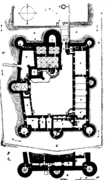 Plan of the present castle
Plan of the present castle
-
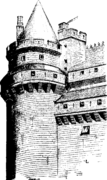 Northeast tower restored
Northeast tower restored
-
 View in 2008
View in 2008
-
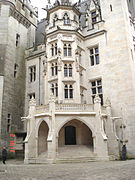 Entrance to the principal residential block
Entrance to the principal residential block
-
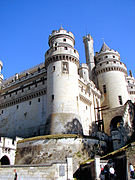 Entrance side view
Entrance side view
-
 From an 1895 dictionary
From an 1895 dictionary
-
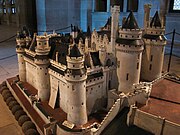 Stone scale model
Stone scale model
-
 Donjon drain-pipe
Donjon drain-pipe
See also
- List of castles in France
- Domaine du Bois d'Aucourt d'Adolphe Clément-Bayard à Pierrefonds, a former hunting lodge of Louis XIV.
References
- ^ Base Mérimée: Château, Ministère français de la Culture. (in French)
- Vinegar, Aron (2023-10-14). "Chatography". Journal of the Society of Architectural Historians. 71 (3): 362–385. doi:10.1525/jsah.2012.71.3.362.
- "Centre des Monuments Nationaux - Château de Pierrefonds" (in French). Oise Tourisme. 28 August 2002. Retrieved 17 April 2017.
External links
- Château de Pierrefonds, Centre des monuments nationaux
- Base Mérimée: Château, Ministère français de la Culture. (in French)
- Photos of Pierrefonds castle (in Polish)
- 19th century painting of the castle by Gilbert Munger
49°20′49″N 2°58′49″E / 49.34694°N 2.98028°E / 49.34694; 2.98028
- 1400s establishments in France
- Buildings and structures completed in 1407
- 15th-century fortifications
- Castles in Hauts-de-France
- Châteaux in Oise
- Museums in Oise
- Historic house museums in Hauts-de-France
- Monuments historiques of Oise
- Gothic architecture in France
- Monuments of the Centre des monuments nationaux
- Napoleon
- Louis Philippe I
- Napoleon III
- Imperial residences in France
- Royal residences in France